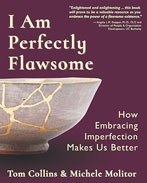
 |
I Am Perfectly Flawsome: How Embracing Imperfection Makes Us Better
by Tom Collins and Michele Molitor
WME Books
The book opens with a bold declaration that all forms of perfectionism are unhealthy. Collins and Molitor denounce the concept of “normal” perfectionists who are more productive and achieve greater success. As perfection is inherently unattainable, its pursuit is an inevitable path to frustration, which adversely affects mental and physical health, relationships, creativity, and productivity. Inspired by Kintsugi—the Japanese art and philosophy of “golden repair”—the authors advocate rejecting perfectionism and adopting the “Flawsomism” mindset of celebrating imperfection, striving for excellence, and embracing failure as an opportunity for growth.
The applications for Flawsomism are far-reaching: for leadership and individuals in the workplace; for women struggling with male-dominated careers, working motherhood, and unrealistic ideals perpetuated by social media; for parents who pass perfectionism to their children through biology, example, and parenting styles; and for aging adults. The book also includes a discussion of the benefits of using AI to jumpstart the imagination but cautions against allowing it to replace humanity’s imperfections, which are the cornerstone for human uniqueness and creativity.
With its inspirational quotes and glimpses of the authors’ personal struggles with perfectionism, this book is a triumph in the self-help genre. Collins and Molitor deliver a smart discussion of prevailing thoughts on perfectionism, Japanese philosophy, and modern society. Carefully crafted questions at the end of each chapter encourage self-reflection to uncover limiting beliefs and critical voices. The authors offer clear, concrete tactics for eliminating toxic perfectionism. Well-written and well-thought-out, the book strikes the perfect balance between a scientific study and a self-improvement resource. The authors provide significant research data to substantiate their views. Additionally, excerpts from Aly Raisman’s inspirational biography Fierce, Brené Brown’s Daring Greatly, and emotional interviews of survey participants make for a relatable, motivational read.